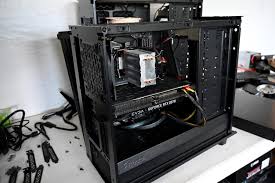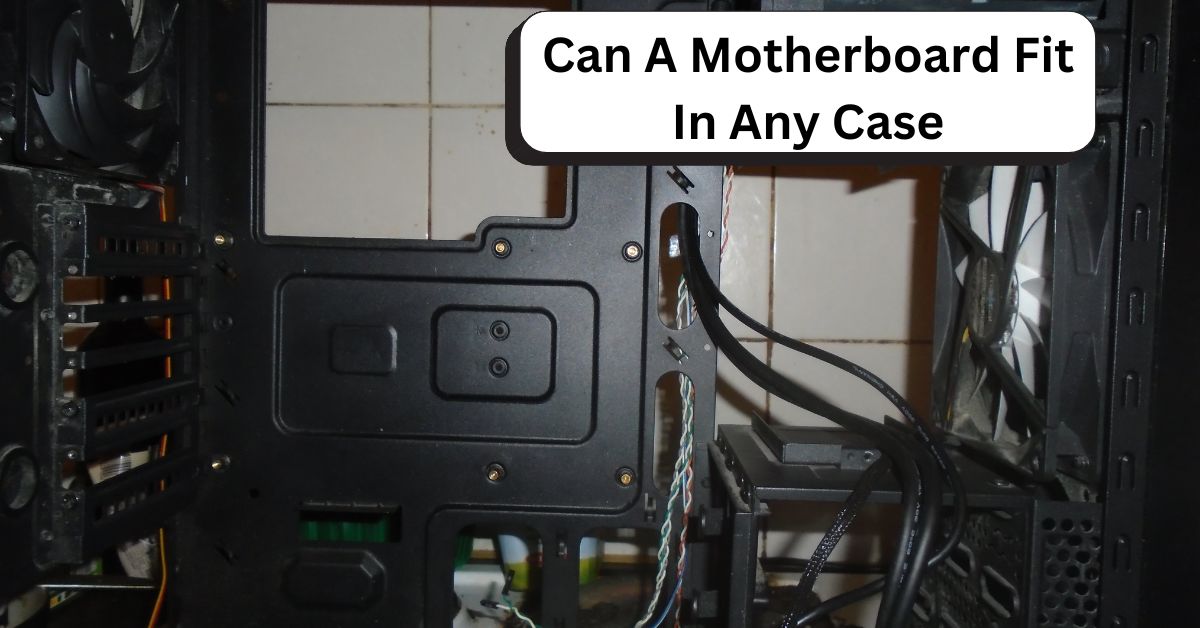When building or upgrading a PC, one of the most common questions is whether a motherboard can fit in any case. To make sure your system works properly, understanding motherboard and case compatibility is essential.
No, a motherboard cannot fit in any case. It must match the case size. Motherboards come in different sizes, like ATX, Micro-ATX, and Mini-ITX. Always check your case’s size to make sure it fits your motherboard.
In this article, we will discuss “Can A Motherboard Fit In Any Case”.
Table of Contents
What is a Motherboard?
The motherboard is the main component of your computer. It connects all the parts, such as the CPU, RAM, storage, and graphics card. Without a motherboard, your PC wouldn’t work. There are different sizes of motherboards, and this is important when choosing a PC case.
Understanding Motherboard Sizes:
ATX Motherboards:
ATX (Advanced Technology eXtended) motherboards are the most common and come in various sizes, including standard ATX, microATX, and miniATX. The standard ATX motherboard is the largest of the three and typically requires a case that supports ATX form factors.
MicroATX and MiniATX:
MicroATX motherboards are smaller than standard ATX boards but still fit in most ATX cases. MiniATX motherboards are the smallest and can fit into smaller cases designed specifically for miniITX or microATX boards.
What is a PC Case?
A PC case is the housing that holds all your computer components, including the motherboard, power supply, and storage drives. Cases come in different sizes and designs. The size of the case you choose must match the size of the motherboard you plan to install.
Can Any Motherboard Fit in Any Case?
No, a motherboard cannot fit in any case. The case must support the form factor of your motherboard. For example, an ATX motherboard requires a case that supports ATX sizes. However, a larger case, like one that supports ATX, can often fit smaller motherboards, such as Micro-ATX or Mini-ITX.
How to Check Case Compatibility?
When buying a case, check the product description to see what motherboard sizes it supports. Most cases will list which form factors they are compatible with (ATX, Micro-ATX, Mini-ITX). This information ensures you are buying a case that fits your motherboard.
Does Case Size Affect Cooling?
Yes, case size can affect cooling. A larger case typically has better airflow, which helps keep your PC cooler.
Smaller cases may have limited space for fans, so you need to make sure that the cooling is sufficient for your needs. A case that fits your motherboard and has good cooling is ideal for long-term performance.
How to Install a Motherboard in a Case?
Once you’ve picked a compatible case, installing the motherboard is easy. First, align the motherboard with the standoff screws in the case.
These screws keep the motherboard in place. Next, carefully screw the motherboard onto the standoffs, making sure it’s secure but not too tight.
What About Ports and Connections?
Before buying a case, check the ports and connections on the motherboard. You want to make sure the case allows easy access to these ports. For example, if your motherboard has many USB ports, make sure the case’s design doesn’t block them.
Types of Computer Cases:
Full-Tower Cases:
Full-tower cases are large and offer ample space for all motherboard sizes, including standard ATX, microATX, and miniATX. They are ideal for users who need extra room for additional components and better airflow.
Mid-Tower Cases:
Mid-tower cases are the most popular choice due to their balance between size and space. They generally accommodate standard ATX and microATX motherboards but may have limitations for miniATX boards.
Mini-Tower Cases:
Mini-tower cases are compact and designed for smaller setups. They typically support only microATX and miniATX motherboards, making them unsuitable for standard ATX boards.
Does a Larger Case Mean Better Performance?
Not necessarily. A larger case can provide more airflow and space for upgrades, but it doesn’t automatically mean better performance. The performance of your PC depends more on the components inside, like the CPU and GPU, than the size of the case.
Upgrading or Building a New PC: Choosing the Right Case
When upgrading or building a new PC, choosing the right case is as important as choosing the right motherboard. If you plan to add more components in the future, like additional storage or a better graphics card, a larger case might be a better option.
Can a motherboard fit in any gaming case?
No, not all motherboards fit in any gaming case. Motherboards come in different sizes like ATX, Micro-ATX, and Mini-ITX. The case must support the motherboard’s form factor for it to fit properly.
Can a motherboard fit in any case Dell?
Dell cases are often designed for specific motherboards. You must check the motherboard’s size and the case’s compatibility. Some Dell cases may only support specific Dell motherboards due to proprietary designs.
Read: Acer Aspire Xc 603g Motherboard Tx1 Pinout – A Guide of 2024!
Motherboard case compatibility checker?
Use online compatibility checkers to see if your motherboard fits a case. Websites like PCPartPicker help verify if the motherboard’s form factor matches the case, ensuring proper fit and easy installation of components.
How to know if motherboard will fit in case?

Check the form factor of both the motherboard and case. If they match, the motherboard will fit. ATX, Micro-ATX, and Mini-ITX are common sizes. The case’s manual or description usually lists supported motherboard sizes.
Can any motherboard fit any graphics card?
Most motherboards support a variety of graphics cards if they have a PCIe slot. However, ensure your case has enough space for larger GPUs, and check the power supply to confirm it can handle the graphics card’s power needs.
Read: Do Motherboards Have Sd Card Slot – Complete Guide of 2024!
How to make sure a new motherboard will fit your PC?
To ensure fit, check the form factor of your current case and new motherboard. Both must be compatible. Also, confirm that the case has enough space for ports and cooling systems required by the motherboard.
Can any motherboard fit into any case?
No, motherboards come in various sizes, and not every case supports all sizes. You must check the form factor. Common types include ATX, Micro-ATX, and Mini-ITX, and the case needs to match the motherboard’s size.
Will motherboard fit into the case?
For the motherboard to fit, its size (form factor) must match the case. Cases are usually built to support specific motherboard sizes like ATX or Mini-ITX. Always verify the case’s specifications before purchasing.
Can any motherboard fit any case?
No, a motherboard cannot fit just any case. The motherboard’s form factor must match the case’s supported sizes. Common motherboard sizes are ATX, Micro-ATX, and Mini-ITX, so always check case compatibility.
How to know if a motherboard is compatible with a case?
To check compatibility, verify that the motherboard’s form factor matches the case’s supported sizes. Common sizes include ATX, Micro-ATX, and Mini-ITX. Also, check if the case has space for ports and additional cooling systems.
Does motherboard size matter for case?
Yes, motherboard size (form factor) matters. Cases are built to support specific motherboard sizes like ATX, Micro-ATX, or Mini-ITX. The case must match the motherboard’s form factor to ensure proper fit and functionality.
Are motherboards one size fits all?
No, motherboards are not one size fits all. They come in different form factors like ATX, Micro-ATX, and Mini-ITX. The case must support the specific size of the motherboard for it to fit and work correctly.
FAQs:
1. Can I fit a Mini-ITX motherboard in an ATX case?
Yes, most ATX cases can fit smaller motherboards like Mini-ITX or Micro-ATX, as they have multiple mounting points for different sizes.
2. What happens if my motherboard doesn’t fit my case?
If your motherboard doesn’t fit your case, you won’t be able to install it properly. You will need to get a case that matches your motherboard’s form factor.
3. Does case size affect the choice of power supply?
Yes, smaller cases may require smaller power supplies, such as SFX units, while larger cases can accommodate standard ATX power supplies.
4. Can I upgrade my motherboard without changing my case?
Yes, as long as the new motherboard matches the form factor supported by your existing case (e.g., upgrading from an ATX motherboard to another ATX motherboard).
5. What’s the difference between ATX and Micro-ATX motherboards?
ATX motherboards are larger and offer more expansion slots, while micro-ATX boards are smaller and usually have fewer features but can fit into more compact cases.
Conclusion:
In conclusion, not all motherboards can fit in every PC case. You must check the form factor, such as ATX, Micro-ATX, or Mini-ITX, to ensure compatibility. Bigger cases offer more space and airflow, while smaller cases are more compact. Always choose a case that fits your motherboard for easy installation and good performance.
I have 15 years of experience in the PC motherboard industry. I am passionate about helping people understand computer technology and write in a way that’s easy to follow. My expertise ensures that my articles provide valuable insights and practical advice for anyone interested in PC components, regardless of their technical background. My goal is to make complex topics accessible and useful for readers around the world.

[…] Can A Motherboard Fit In Any Case – A Ultimate Guide of 2024! How Long Do Motherboards Last – A Complete Guide of 2024! Does Any Power Supply Work With Any Motherboard – Guide of 2024! Should I Connect HDMI To GPU Or Motherboard – Guide Of 2024 What Graphic Cards Are Compatible With My Motherboard – 2024 Guide! […]
[…] Can A Motherboard Fit In Any Case – A Ultimate Guide of 2024! How Long Do Motherboards Last – A Complete Guide of 2024! Does Any Power Supply Work With Any Motherboard – Guide of 2024! Should I Connect HDMI To GPU Or Motherboard – Guide Of 2024 What Graphic Cards Are Compatible With My Motherboard – 2024 Guide! […]
[…] Can A Motherboard Fit In Any Case – A Ultimate Guide of 2024! How Long Do Motherboards Last – A Complete Guide of 2024! Does Any Power Supply Work With Any Motherboard – Guide of 2024! Should I Connect HDMI To GPU Or Motherboard – Guide Of 2024 What Graphic Cards Are Compatible With My Motherboard – 2024 Guide! […]
[…] Acer Aspire Xc 603g Motherboard Tx1 Pinout – A Guide of 2024! Do Motherboards Have Sd Card Slot – Complete Guide of 2024! Do All GPU Fit All Motherboards – Comprehensive Guide – 2024 Is ASRock A Good Motherboard – A Complete Guide Of 2024! Can A Motherboard Fit In Any Case – A Ultimate Guide of 2024! […]